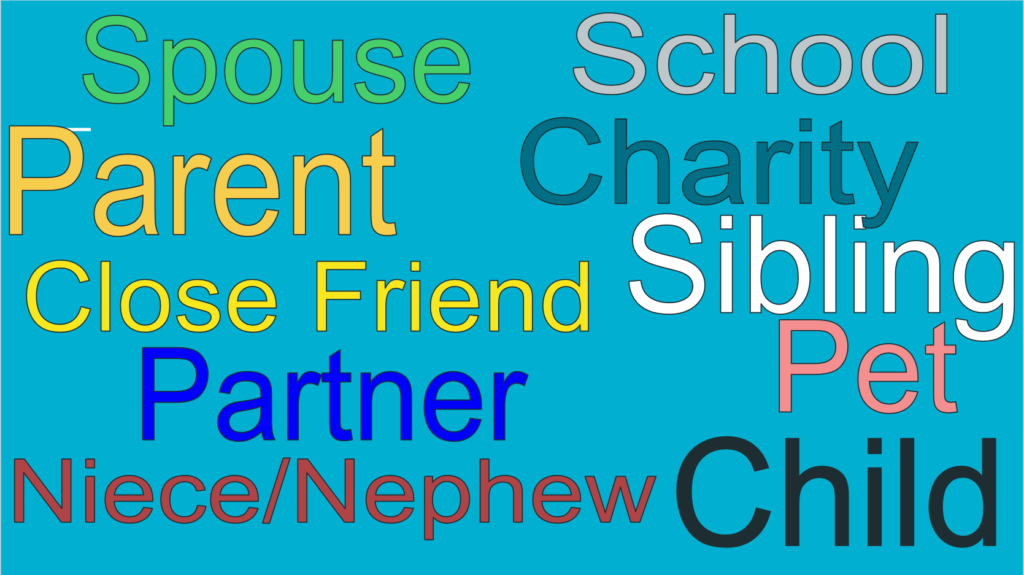Have you ever wondered who you should name as your beneficiary? This question can cause a lot of stress, but it is very important to address because it greatly simplifies the ability for your assets to transfer to the individuals you choose, should the worst occur.
I want to help with a strategy guide on what a beneficiary is, what assets typically have beneficiaries and probably the main reason you are here reading this, whom you may want to name using a few sample considerations.
What is a Beneficiary?
The definition of a beneficiary according to Merriam-Webster is “one that benefits from something”. That does not sound too bad at all, but in this case, a beneficiary is tied to death. This makes discussing the topic with loved ones awkward and grim, which is why you probably had to ask Google instead (unless you are awesome and already subscribed to my strategy guides or are following me on social media).
Death, no normal person ever looks forward to receiving funds this way, but the famous quote of Ben Franklin goes, in this life, nothing can be said to be certain except death and taxes.” One great and important reason you should name beneficiaries on as many accounts as possible is that it allows your assets to be transferred without going through the probate process, which greatly reduces the time, paperwork, and costs involved with transferring the assets.
One last note before we move on, a beneficiary can be beneficiaries! You can slice and dice your beneficiary percentages however you like. Additionally, you can name primary beneficiaries and contingent beneficiaries. Contingent beneficiaries will only receive your asset if the primary beneficiary is not available to receive the asset.
Types Assets to Name Beneficiaries
Most Common (Usually Require a Beneficiary)
Life Insurance
The primary reason for life insurance is to provide a cash infusion for your beneficiaries at your death, which is why beneficiaries are required in the policy opening process. (Most young families do not have proper life insurance coverage, feel free to find out more about this important planning area in my strategy guide.)
Retirement Accounts
Although not technically required, most financial institutions insist on establishing beneficiaries at the time of account opening due to the tax benefits to your beneficiary if you properly name an individual. Failing to do so could result in less flexibility in tax planning for those that ultimately inherit your estate.
Less Common (Beneficiary Optional)
Bank Accounts
When I used to work at the credit union, I would always offer to add beneficiaries to the account, but I know most banks do not ask this as a part of the account opening process. I have seen banks refer to these forms as both Beneficiary Designation forms, as well as, Transfer on Death forms.
Brokerage (Non-Retirement) Accounts
The common form needed for these accounts is a transfer on death form. After submitting you will likely see the title on your account changed to include TOD.
Vehicles
Not too common, but it can be done with the DMV.
Real Estate
To name a beneficiary on real estate like your home, you may have to pay a minimal fee and complete a beneficiary deed.
Last Will & Testament
Naming a beneficiary through this method does not allow your assets to avoid probate, but your will acts as a catch-all for all your assets and items that do not already have a beneficiary on file. To find out more detail about estate planning documents for growing families, check out my strategy guide.
Beneficiary Considerations
Are they reliant on you or your assets?
This is always the most cut and dry beneficiary to name. If you have a spouse or significant other where your finances are either mingled or are reliant on each other to afford current lifestyle, then you may want to heavily weight this person as the primary beneficiary of your assets.
Children are also very reliant on your income before they become adults. In most situations, it is appropriate to first name spouse or significant other if applicable as the primary beneficiary and then name the children as contingent. If there is not a significant other to name or you feel that person may not best handle the assets you may name the children directly as primary beneficiaries. Although the assets will technically be owned by your children, they will need to be managed either in trust or by their legal guarding until they reach either 18 or 21 depending on the state. If you wish to name a trustee, you will have to work with an estate attorney to draft trust documents.
Do You Owe or Feel Obligated?
If you have an outstanding debt or obligation to someone, you may want to name this person at least partially as a beneficiary. For example, My parents are still named a beneficiary for a portion of my life insurance. Although I do not actually have a debt with them, they helped me tremendously as a teenager by purchasing a vehicle that was in great shape.
Final Expenses
Are you providing funding for final expenses? Funeral expenses can be a significant cost after your passing. It may make sense specify assets to the individual that you think would be in charge of coordinating these affairs to help cover that cost.
Family/Friend Equality?
If you don’t have anyone who is reliant on your income and that you do not owe an obligation you may start looking at siblings or close friends as potential beneficiaries. This can get really tricky if you overweight or underweight those who may see themselves on an equal level. Sometimes there is a good reason to not make the distribution equal or flat out leave someone out of your inheritance but acknowledging it may stir up drama.
Who Needs it the Most or Could Get the Most Use?
If none of the above considerations have applied to your situation it does come down to more of a personal preference than logic. These are the two last questions you would likely want to ask yourself before saying screw it and leaving everything to your dog.
Commonly Named Beneficiaries
In no particular order here is a list of the most common beneficiaries I have seen in my 13-year career in the financial services industry:

Conclusion
I hope that after reading through this strategy guide on how to choose your beneficiaries you gravitated towards achieving clarity on whom that could be. It is important to note that life is constantly changing, and you can always adjust your beneficiaries in the future if a major event occurs or if you drift apart from those that you originally named. To make sure you do not get stuck, make it a point to base your decision on what you know today and not worry about the million what if’s.




 About the Author
About the Author

